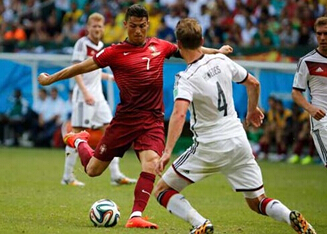
On the long voyage to World Cup triumph, Belgium and Uruguay are two icebergs that the favorites would rather avoid. Both nations, despite being underdogs in this year's tournament, have the ability and the nous to upset their bigger and brasher rivals. Yet it's remarkable, given their small size and history as geopolitical doormats, that they remain competitive at all.
Belgium, for example, has less than a tenth of the population of Russia, its rival in the group stage, but is regarded as a far greater threat. And then there is Uruguay, which despite fewer than 4 million citizens -- barely a sixth of the population of greater S?o Paulo -- is one of the teams Brazil would least like to meet on its way to the final. How is this so?
In Belgium's case, the reasons are more readily apparent. A nation sewn largely from a patchwork of three peoples, the Flemish, Walloons, and Germans, its football team nevertheless features several stars of African descent. Currently, Belgians of Moroccan descent -- including midfielder Marouane Fellaini and winger Nacer Chadli -- make up the biggest non-European group; for many Moroccans, French is a second language. Like France with its North African and Caribbean contingents and Germany with its Turks, Belgium's national team has benefited from multiple populations: one from Western Europe, one from Africa, and one from Eastern Europe.
Over time, this ethnic blend has led to an uncommon harmony among the current squad, whose young players -- notably Eden Hazard and Romelu Lukaku of Chelsea, and Adnan Januzaj 贾努扎伊of Manchester United -- are the envy of many of their competitors.
Uruguay represents a more curious case, in that its players are footballing aristocracy disguised as minnows. Like Belgium, it is a relatively young nation, yet on the field of play the Uruguayans are old hands. They have won the World Cup twice, first at the inaugural event in 1930, and then in 1950, when Brazil hosted the tournament. The latter occasion, when Brazil succumbed in front of a world-record 200,000 fans or more, is referred to there as the "Maracanazo", a national tragedy still felt today.
Uruguay owes much of its success not just to its passion for football but also to the early inclusiveness of its culture. In that 1950 tournament, at a time when neighboring Brazil still regarded its black players with suspicion, Uruguay boasted a black captain, the brilliant Obdulio Varela. Moreover, Uruguay's victories in the World Cup's formative years established a pedigree that endures to this day, with many of its footballers -- such as Liverpool's Luis Suárez and Paris Saint-Germain's Edinson Cavani -- playing abroad for some of the world's biggest clubs.
Belgium and Uruguay are two diminutive countries that have maximized their advantages through inclusiveness, and of which Brazil, Argentina, Spain and Germany -- the quartet of forerunners for this year's title -- will rightly be wary. They, in the manner of Brazil's indigenous mosquitos and scorpions, are a useful reminder that small can often be deadly.












